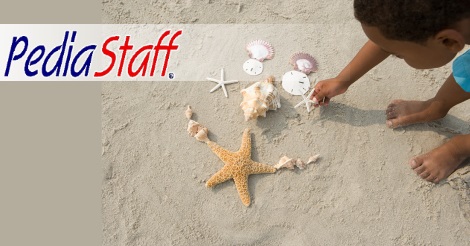The Fun and Function of Using Silly Sentences in Articulation and Language Therapy

Holly Flynn, M.S., CCC-SLP
You might remember the phrase, “Sally sells sea shells by the sea shore.” To some it’s a silly tongue twister, but to a speech therapist it’s a classic example of using silly sentences to stimulate language and articulation targets in speech therapy. These sentences are usually made up, use alliteration (using the same sound or letter to start every word), rhyming words or use made up characters in crazy situations. They usually involve a character (Mateo the matador), an action (makes millions on macaroni museums) and a location (in Madrid). Silly isn’t just for laughs, silly can be fun and functional in speech therapy.
Silly Sentences in Articulation Therapy
Why use made-up, unreal sentences in articulation therapy? Seems like a reasonable question, after all, it can’t help to talk about things that aren’t real, right? Wrong. Using silly sentences is very practical. First, a sentence that uses alliteration offers repeated opportunities for practice. Articulation therapy yields the best results when children have opportunities to use a sound repeatedly during a session. In a sentence like “Sally” (above), the “s” sound occurs in the initial position six times. Some words or target sounds aren’t always easy to use in conversation, so a silly situation gives an excuse to use them. Second, while a fictitious sentence might not be a sentence you would ever say in real life, but it’s fun to think about, and that silliness can be motivating for children in therapy. Third, silly sentences can be constructed in therapy, with the help of the student. Rather than using pre-made flashcards, therapists can involve the child in thinking and creating sentences using their target sounds.
Silly Sentences in Language Therapy
In language therapy, silly sentences have their place too. Without a visual, a silly sentence conjures up a mental image for most and encourage a bit of abstract thinking. Lets practice by picturing the phrase, “Pete the pegleg pirate plays with his purple piggy, Petunia.” This can be used as an opportunity to stimulate great descriptive language concepts (what does Pete look like?), critical thinking/problem solving (how could a pig become purple?), and make predictions (what will they play?). Showing this type of sentence in a picture alone elicits a nice language sample from some patients who have difficulty with unexpected or novel events. Talking about absurdities also welcomes why type questions and how (how can you change to picture to make it normal?) and some silly sentences can stimulate social pragmatic functions like illustrating idioms or figurative language. Finally, also consider silly sentences as a story starter for narrative development or discussing who, what, where questions.
For therapy, try some creative Googling to find a set of silly pictures (a dog with a hat, a man with a tail etc). Or use the above materials listed for articulation and illustrate them with the child as a group activity.
About the Contributors:
Holly Flynn, M.S., CCC-SLP is a licensed and practicing speech and language pathologist outside of Boston, Massachusetts. She splits her work between a private outpatient clinic and augmentative and alternative specialty clinic where she meets the needs a diverse pediatric caseload. Holly strives to incorporate traditional play-based tasks with technology for her clients while educating and involving parents throughout. Articulate Technologies, the makers of Speech Buddies, is comprised of an interdisciplinary team of SLP’s and engineers who’s mission is to improve communication around the world by providing proven solutions. Articulate Technologies is based out of San Francisco, CA, visit www.speechbuddy.com for more information.
Speech Buddies offers tools for parents and speech therapists to help children overcome speech disorders. Consider using Speech Buddies to make articulation practice fun and engaging for your child.
Please support our contributors and Visit the Speech Buddies Website!
PediaStaff is Hiring!
All JobsPediaStaff hires pediatric and school-based professionals nationwide for contract assignments of 2 to 12 months. We also help clinics, hospitals, schools, and home health agencies to find and hire these professionals directly. We work with Speech-Language Pathologists, Occupational and Physical Therapists, School Psychologists, and others in pediatric therapy and education.
